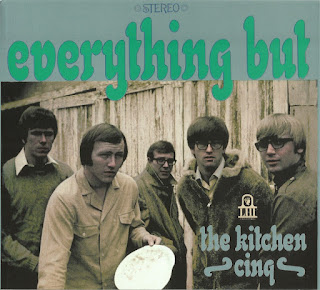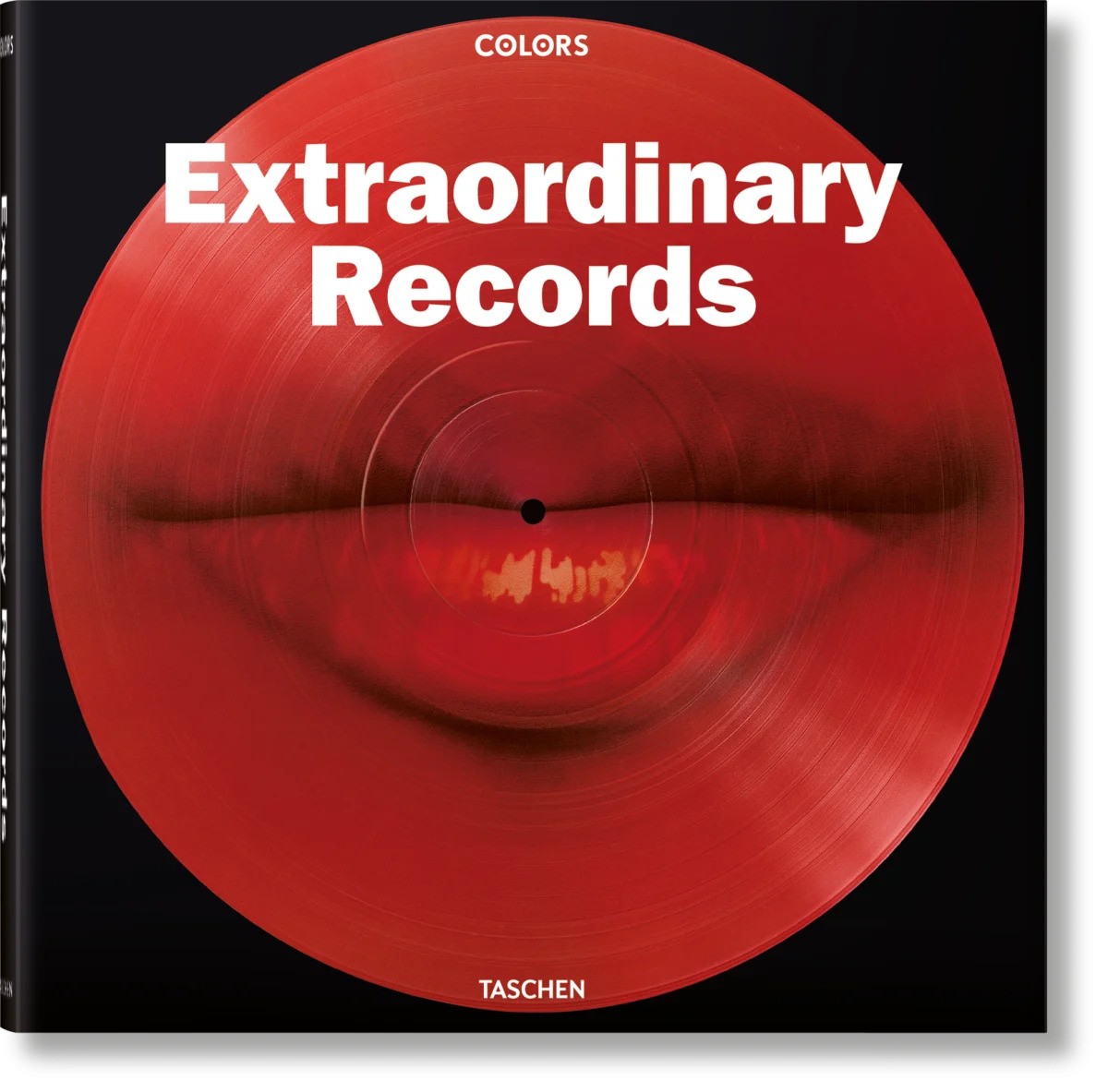The Kitchen Cinq
The Kitchen Cinq – When The Rainbow Disappears: An Anthology 1965-1968
Since way back in the early 1980s when some of us (at that time) young ones were busy discovering all manner of beat, garage and psychedelic sounds from the 1960s for the first time, a good pal of mine took a chance upon a rather odd looking album by an obscure, weirdly named group who called themselves The Kitchen Cinq. No sooner had he got it home to the flat and dropped the needle on it than we were immediately sold, being drawn in and furthermore altogether smitten by the breadth of vibrant, lively beat sounds being offered up on each of the featured cuts we were hearing.

The title of the album, Everything But… The Kitchen Cinq, had originally been released on Lee Hazlewood’s Los Angeles based LHI label back in mid-1967 but the group themselves originally hailed from Amarillo, in Texas: Jim Parker (guitar and vocals), Johnny Stark (drums and vocals), Mark Creamer (lead guitar, organ, harmonica and vocals), Dallas Smith (bass) and Dale Gardner (lead vocals) had already recorded a rather excellent 45 under the name “The Y’Alls” for the Ruff label in 1966. Here was a disc that pitted a terrific version of the Beatles’ Revolver cut “Run For Your Life” with some scorching teen punk majesty in the shape of one of their own compositions, the supremely infectious “Please Come Back”. For the making of their album, however, and with the hope of a thrill-filled life beyond the confines of their less glamorous Texas upbringing, these smart teenage hopefuls grasped the opportunity afforded them by their managers, and industry moguls and lit out for the bright lights of Hollywood and the beckoning rock’n’roll dream. Johnny Stark and Mark Creamer’s “Determination”, alongside Jim Parker’s “Young Boy” and a different, later take of the afore-mentioned “Please Come Back” its title now amended to “Please Come Back To Me” (Stark and Creamer again) are inherently strong, energetic and intentional examples of the group’s efforts at the craft of songwriting, not to mention their striking vocal abilities; three and occasionally four-part harmonies filling out the sound as well as showcasing a natural ability to conjure up some truly great, and thoroughly holistic-sounding pop moments. The Kitchen Cinq’s inventiveness and keen drive are evidenced time and time again throughout the original album tracks and, here too, beyond, and before.
“Determination” itself is an unstoppable juggernaut of commercial sounding garage punk treasure, while Parker’s equally heartfelt capturing of the essence of youth in song that is “Young Boy” is both thought-provoking and breathtaking in its measure. “If You Think”, penned by LHI staff writers Raul Danks and John Taylor, meanwhile successfully channels the path of folk-pop introspection and whilst it’s over all too quickly there is something truly magical in its overall brevity. And who could forget the splendid, if cautionary intonation of this collection’s splendid title track written by Bob Corso, “When The Rainbow Disappears”, their final ’67 release for Hazlewood’s outlet, but – as was the bulk of the sessions for the album – recorded back in the final months of ’66. Although this 45 was to also cinq (ouch) without much trace at the time, it remains one of the group’s defining moments, yet where the emphasis is dialled more towards the now somewhat more prominent psychedelic sound! This and the hugely appealing jangling, and echo-fueled guitar dynamics that can be heard throughout are part and parcel of what makes The Kitchen Cinq’s rather unique sound. And on the opening track “You’ll Be Sorry Someday” there is what set compiler and producer Alec Palao calls these “dead air” pauses, or as I tend to think of them; great, expectant cliff-hanger stop/start instances which throw you every time. Genius! This too was written by Bob Corso. He was a friend of Hazlewood’s that was brought in to help the group try to find more potential hit-making material at the time. Anyone know of anything else that Corso has done?

Specifically, those above-named tracks remain among the core highlights of The Kitchen Cinq’s recorded works, all of which has recently been compiled for release on
When The Rainbow Disappears: A Kitchen Cinq Anthology 1965-1968 issued by US specialist label
Light In The Attic. The original album would also feature a brace of thoroughly convincing, and well-played covers, including The Hollies “I Can’t Let Go”, Neil Diamond’s “Solitary Man”, and a tremendous version of Hazlewood’s own “Need All The Help I Can Get”; also issued in a version by The Kitchen Cinq’s assigned producer Suzi Jane Hokom. The group also delivered up a supremely intense version of Buffy-Saint Marie’s oft-covered (but seldom bettered) “Codine”. This hard-hitting tale of woe was much beloved by the burgeoning freak-scene.
Largely ignored for decades by all but those ardent admirers of mid-to-late 60s rock’n’roll beat raunch, US specialist label Light In The Attic has recently teamed up with core members of The Kitchen Cinq, alongside 60s chronicler extraordinaire and super-fan Alec Palao to put together this long-anticipated overhaul and re-evaluation of The Kitchen Cinq’s lone long-player, here resplendent with an attendant cache of forty-five sides – including largely unsung beauties such as “Ellen’s Fancies (Ride The Wind)” and Al Kooper’s wonderfully atypical “The Street Song”. There are also some remarkable, hitherto unheard demos here, among them Jim Parker’s strangely compelling “Figareaux”, a raw ‘n alive garage romp called “Try” and a cool, spirited bash through everyone’s favourite three-chord early punk-style smasher, the Them perennial “Gloria”, all done as by The Illusions. Also praiseworthy is their adept reading of Goffin & King’s elegant pop panorama “Wasn’t It You” also covered by top London mod beats The Action. That this sensational compendium can now usher the music of this long-forgotten 60s Texas combo into the homes of those who have been seriously appreciating these kinds of sounds forever is nothing short of a revelation. Not only that, but The Kitchen Cinq’s Anthology should also prove a hugely rewarding experience for those still out there who dig to hear such sounds but haven’t, up until now, been acquainted with the ‘Cinq’s many, various and versatile talents. Yeah! And about time too!

Interview with Jim Parker, Mark Creamer and Johnny Stark of The Kitchen Cinq by Lenny Helsing.
Just for some background info and context, the five-piece rock’n’roll group The Kitchen Cinq originally hailed from the town of Amarillo, in Texas, and had been operating throughout the early-mid 1960s, firstly under the name The Illusions, issuing one disc for Dot before releasing a tremendous piece of teen punk on 45 for the Ruff label as The Y’Alls, coupling a sonic, fuzz-driven take of The Beatles’ “Run For Your Life” with their own exquisite “Please Come Back”. Soon after they would split for Hollywood on the advice of their managers, signing a deal with Lee Hazlewood’s newly-birthed LHI label. But before any new recordings were released, the group was given a new name, The Kitchen Cinq, and would then go on to issue a bunch of great singles and one solid LP, Everything But… The Kitchen Cinq which LHI released in USA and Canada during the spring of 1967! All this and much much more is unveiled in the accompanying booklet of When The Rainbow Disappears – A Kitchen Cinq Anthology 1965-68 issued recently on CD and vinyl courtesy of Seattle-based label Light In The Attic.
Lenny Helsing: First of all I can’t tell you how excited I am for those people who don’t have to search high and low any more to find copies of your original album and singles. How does it feel to know that the material of The Kitchen Cinq is now currently available on both CD and vinyl courtesy of the good people who run the Light In The Attic label. It’s certainly good news for those people who are already fans of the group, and for those, perhaps, younger folks who are potential fans and appreciators of the group?
Jim Parker: Let me thank you for your part in making this project possible. You were a player in this too! I am pleased that our recordings have all been put on “old/new school” vinyl and digitally re-mastered for the CD. Alec Palao did a marvelous job on the booklet and liner notes. I hope it does generate some more appreciation for our skill level at the time. Truly a wonderful feeling of being validated for some of our earliest efforts in the business of music.
Mark Creamer: I am so flattered that Light In The Attic produced the Anthology… and the fact that it was packaged so beautifully and not only with CDs but with actual VINYL just makes the feeling more special.
Johnny Stark: It feels great to have our songs out there again. It is nice to see the additional cuts which were recorded here in Texas. You know everything is bigger here. Very nice to know we have fans and that the material must have stood the test of time. You know I’ve always heard that “everything old is new”. I guess that’s true. Love the fans and so glad they enjoy our music. Really wish that Dallas and Dale could be here to enjoy this.
Lenny: Can you give a little background information to our readers as to how this all came to be, and how long this has been in the pipeline?
Jim: I was totally blindsided by the call from Alec Palao early 2014 asking if he could come to my home in Alabama and interview me in person. I’ve been approached by others over the years who interview me over the phone or emails for their websites and blogs so that was impressive to start with. I had the feeling that this was legitimate and that The Kitchen Cinq Anthology was going to come together after 50 years. After my initial call from Alec I told him Mark Creamer was in California and gave him his contact information so he could interview him first.
Alec came to my house and hit the record button from his first step in, through lunch, to his last step out. I was moved by his questions and depth of his knowledge of the Cinq. He actually knew more about our works than we did collectively. I supplied many photos and articles I had saved over the years. I was kind of the historian of the group. I have acetates of some of our work.
I had been in touch with Johnny Stark over the years but his numbers had changed and he dropped off Facebook. I got the number for Suzi Jane Hokom, our producer, from Alec and had a pleasant chat with her. Her sister is Johnny’s ex-wife so she contacted him and had him call me for the good news. Alec and Johnny made contact at that point.
Mark: It has been at least a couple of years in the making. When Jim first called me, I was working in Bakersfield, CA and was so surprised that anyone would be interested in what we had done so many years before.
I got a call from a wonderful gentleman named Alec Palao and we made arrangements for him to come to Bakersfield for a “chat”. I had no idea that Alec would be so incredibly prepared for this little chat. He had copies of music that we had done that (frankly) I had forgotten. Bear in mind that I had been doing all kinds of music since we recorded those songs, so I can blame my forgetfulness on either the mass of music that I had worked on …or my (gulp) age.
Johnny: Alec Palao made this his project. I was told that he found the album in the $1 bin of a record shop in London. After he moved to the US, he played it at raves on the west coast and got positive reviews. He went to work at Light in the Attic and convinced them to reissue it along with the additional tracks.
Best tracks for me I guess would be “Codine”, “Determination”, “Ellen’s Fancies” and “Still In Love With You Baby”.
Lenny: The new collection, ‘When The Rainbow Disappears – A Kitchen Cinq Anthology 1965-1968’, has some extra material recorded in the group’s early days when you were known as first The Illusions, then as The Y’Alls. Are you happy that these songs are finally out there for the fans and the still curious to hear, and what are one or two of your favorites from this period?
Jim: I am ecstatic to have something like this project to pass to my children and grandchildren. From the Illusions I liked our first release on Dot that didn’t make the cut because of technical issue. It was one I wrote that I would sing over the phone and could put any girl’s name in and have them think I wrote it for them. “Don’t Put Me Down”. As for the early tunes I think “Run For Your Life” and “Determination” and “Young Boy”.
Mark: Again, I am absolutely flattered and very happy that these recordings are available. Not only for the newly found friends of the band but also for myself. I now have a single source for all of the music that we did back then.
As far as my favorites go … It is just so wonderful to be able to revisit this incredible collection. What I now take from it are the memories that are brought back to me …in full fidelity and technicolor. Things like my dad playing on one of the recordings … Watching Jim, Dale, and Johnny singing … Reviewing just exactly where Suzi Jane was sitting when I finished singing the ending segment of “The Street Song”. It was that she was sitting in the control room with her back to the glass. There was this incredibly long pause when I finished. She didn’t move …she didn’t speak. I started wondering what was wrong …either with her or with the way that I sang. I was finally asked to come in to the control room and found (to my relief) that she was, in reality, moved by the song and was without words. Whew!
Favorites? I really don’t have just one or two. That is just who we were …where we were …and what we were doing. I love them all for that.
Johnny: The name The Y’alls was just on the Ray Ruff record. We never played under that name. I might add that by the time we arrived in Hollywood the band could play about 350 tunes. Everything from “Big Balls In Cowtown” to “Summer In The City”.
Lenny: I love that the packaging too has some real exciting information and pictures contained within it. The full colour photograph used in the gatefold, of the group stylishly bathed in a swirling psychedelic light show, for example, really brings the vinyl presentation alive. What can you remember of shows like this the group played at?
Jim: That photo was taken at the famous Cheetah on the Santa Monica Pier. It was one of the coolest places any band could play since it was the legendary Aragon Ballroom in Ocean Park. That was the first place my Mom and Dad came to see us play since our arrival. Dad brought his ear plugs. I guess we were loud but the ballroom was huge. It was a social-dance venue opened in 1942, my birth year and was 14,000 square feet. A few of the bands that played there were The Grateful Dead, The Doors, Pink Floyd, Alice Cooper, Iron Butterfly and more between 1967-1970. I felt like we were doing pretty good and keeping good company. I always looked forward to something besides a bar gig although the Whiskey A Go Go was cool. I have an article about us that evening in my personal scrap book.
Mark: My hat is off to the wonderful people at Light In The Attic. The whole package is an incredible piece of work. Alec Palao is a genius. The liner notes are a thing of true art and a manifestation of what had to have been many … many long hours. I’m so grateful that I was able to spend some time with him.
I guess that we need to write a book about those “times” with the band.
Johnny: It was time for me to go. LHI placed (the group) in the studio with other players cutting the music and I would never allow that to happen. I was the drummer and that was that.
Lenny: You were signed up to put out records through Lee Hazlewood’s LHI label outlet and indeed you were one of the first acts to do so, the idea being that you guys were gonna help launch the label and in the process both The Kitchen Cinq and LHI were gonna smash the charts and reap the benefits of such a success – the name change came courtesy of your manager Tom Thacker as it was thought the previous name The Y’Alls was alright for a group still residing in Amarillo, Texas, but would sound way too parochial and goofy if you wanted to be a part of the new, modern Hollywood pop elite – but of course the reality of the group’s success was kinda different wasn’t it?
Jim: Absolutely! It was tumultuous from my point of view. I was married and had responsibilities. We were not that well organized in that our managers were both doing other jobs. Tom was running LHI and Red was on the road doing his “singer/songwriter/cowboy” thing. There was no strategic plan except to chase the areas that we were getting airplay in and book us. I don’t know if there was an independent record promoter working our single but I do know we had a publicist who I don’t recall ever interfacing with. We were out there with no support and hungry since we were not receiving any money when we were touring. There was a time when unnamed members would “lift” items from the corner markets because we were broke. When we returned from Atlanta Georgia my 1963 Chevy Super Sport, 2 door hardtop, 4 in the floor, was being repossessed because our “accountant” had not paid my $75.00 a month payment. We got it taken care of before I lost it. Rock ‘n Roll heaven Lenny!
Mark: There were all kinds of trials and tribulations with the band. Music, places, with many very funny happenings that were separated by lots of driving and a few moments of equipment related terror.
With my newly found memories, I can truly say that I loved it all.
Johnny: Jim, Mark and myself came together later to write and record under the name Armageddon with an album of the same name issued in 1969 on the Amos label. A lot of growth between the the talents.
That’s about all I can remember as it has been so long ago. I would like to thank you again Lenny for your time and wonderful reviews. Love & Miracles, Johnny.
Review and interview by Lenny Helsing/2016
© Copyright http://psychedelicbaby.blogspot.com/2016







